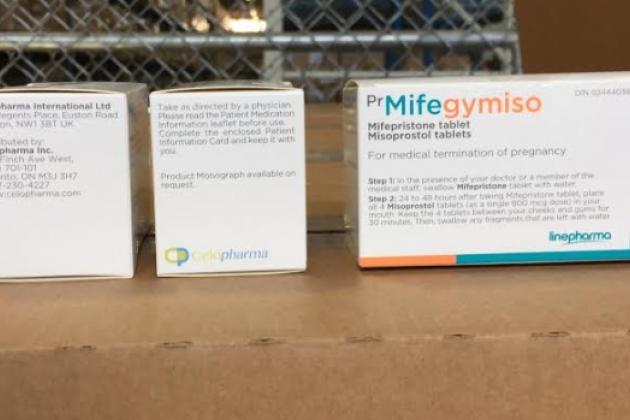
Only 14 New Brunswick doctors have registered for the training that’s required to prescribe the drug
Source: Rachel Cave | CBC News
Celopharma, Canada’s only supplier of Mifegymiso, a prescription medication that can induce early abortion in a woman’s own home, says the medication has not been shipped to New Brunswick.
Only 14 New Brunswick doctors have registered for the training that’s required to prescribe it, confirmed the Society of Obstetricians and Gynecologists of Canada [SOGC].
Mifegymiso was approved by Health Canada in July of 2015, but only on condition that it be prescribed by doctors who have completed the six hour Medication Abortion Training Program provided online by the SOGC.
The SOGC does not release the names of those physicians.
And there is no public directory to find out who they are, although some Canadian reproductive health advocates are trying to create one.
Across the country, 469 doctors have registered.
How it works
Mifegymiso, sometimes pronounced MIFFY-guy-MEE-soh,or MIFFAH-guy-MEE-soh, combines two active ingredients, mifepristone and misoprostolis.
Together, they act to terminate the pregnancy and expel the contents of the uterus.
In Canada, it’s authorized for use up until the end of the seventh week of pregnancy, following the first day of a woman’s last period.
After a medical exam and consultation, patients can swallow the tablets at home.
Designed for rural areas
One leading Canadian researcher in reproductive health, says Mifegymiso holds the promise of transforming access to abortion care for all women, especially those who live in remote and rural communities.
“I think there is a very exciting opportunity in Canada to bring medical abortion closer to where women live,” said Dr. Wendy Norman from her offices at the University of British Columbia.
Norman, who is also a practicing family physician, says the online training is effective and easy to access.
“It’s designed for family doctors out in rural communities, who have never performed abortions or taken part in abortion care,” she said.
“This could be a valuable service to save your patients having to leave your town and travel into big cities, and to leave their jobs, leave their children, and disrupt their lives,” she said.
“This is something that can be provided in confidence and confidentiality within your normal practice setting.”
The medication is expected to cost about $300.
Mifegymiso in New Brunswick
The New Brunswick government “is currently looking at ways to make Mifegymiso available free of charge to all who need it once it becomes available in the province,” wrote one communications officer for the Department of Health.
However, CBC has yet to receive clarification on what that means, and whether “need” is determined by the existence of a prescription or an income test.
Mifegymiso was added to the World Health Organization’s essential medications list in 2005, which evaluates clinical efficacy, patient safety and cost-effectiveness, among other things.
According to the SOGC, the drug has been approved for use in 60 countries.
In some jurisdictions, it’s better known as RU-486.
Some critics have argued that the Canadian regulator has been overly restrictive with the drug.
But Health Canada has defended its position, by publishing a Myths and Facts sheet on its website, in which it says Mifegymiso does present some health risks and that no jurisdictions make it available over the counter.
It says an estimated one in 20 women who use the drug will require a follow-up surgical procedure because their pregnancy is not successfully terminated.
And it says there was one death in Canada that occurred during the clinical trial of mifepristone
The website also attempts to clarify how the medication is purchased.
“As with any medication, a prescription for Mifegymiso can be filled by a pharmacist,” states Health Canada.
“Physicians are not required to order the medication themselves or stock it in their offices.”
“It is simply delivered to the doctor’s office instead of being picked up by the patient, similar to how patients currently access some vaccines and fertility treatments.”
Action Canada for Sexual Health and Rights is working to build a directory of trained doctors so that it can provide that information to women who need it.
“It’s ridiculous that we don’t know who they are,” said Sandeep Prasad, who is the executive director.
Action Canada already operates a 24-hour Canada wide toll free number that provides information about clinics and hospitals that provide abortions.
Prasad says women should also be able to find out where and how they can get prescriptions to Mifegymiso.